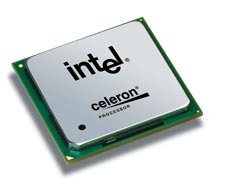Intel upgrades Celeron D with 64-bit extensions
Sanata Clara (CA) - Intel today announced that it will offer support for 64-bit applications in its entry-level Celeron D processor line. The first chip to offer EM64T extensions is the 3.2 GHz Celeron D 351.
After introducing 64-bit support in its Pentium 4 and Pentium D series and urging software developers to create 64-bit applications back in March, Intel today announced that it will integrate EM64T support for its Celeron D chips. This is good news especially for corporations that are already running 64-bit apps and require support for such programs in lower-end computers.
The first Celeron to support EM64T, Intel's 64-bit extension set, is the Celeron D 351. The chip is clocked at 3.2 GHz, carries 256 kByte L2 cache, works with a 533 MHZ FSB, comes in a LGA775 package and can be combined with Intel's 915 or 910 PCI Express chipsets. Also shipping with EM64T are the versions 346 (3.06 GHz), 341 (2.93 GHz), 336 (2.8 GHz) and 331 (2.66 GHz). Consumers can recognize the 64-bit processor by their specific model numbers - the numbering system 3x1 and 3x6 is reserved for Celeron Ds with EM64T support.
Intel has not talked much about the Celeron's future recently. But the company is likely to upgrade the processors significantly within the next 12 months. With the Pentium D 800 (90 nm Smithfield core) and Pentium D 900 (65 nm Presler core, expected in Q1 2006) taking over the mainstream segment, Intel will have to fill a performance gap.
While the company declines to talk about the chip's future in detail, sources told Tom's Hardware Guide that a dual-core Celeron is very unlikely - at least for this technology generation. Instead, Intel may rebrand the current Pentium 4 as Celeron processor until a new architecture will be available. This architecture could be derived from "Conroe", a completely new Pentium architecture that is scheduled for the end of 2006 and will consume significantly less power than current Pentiums.
Get Tom's Hardware's best news and in-depth reviews, straight to your inbox.

Wolfgang Gruener is an experienced professional in digital strategy and content, specializing in web strategy, content architecture, user experience, and applying AI in content operations within the insurtech industry. His previous roles include Director, Digital Strategy and Content Experience at American Eagle, Managing Editor at TG Daily, and contributing to publications like Tom's Guide and Tom's Hardware.
